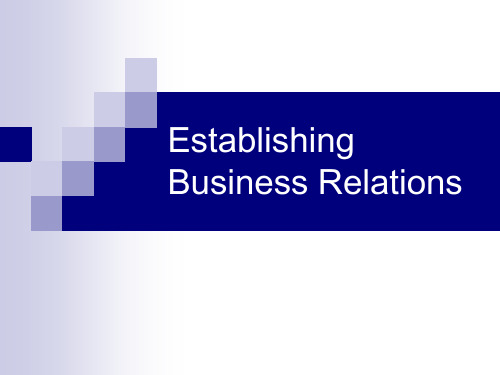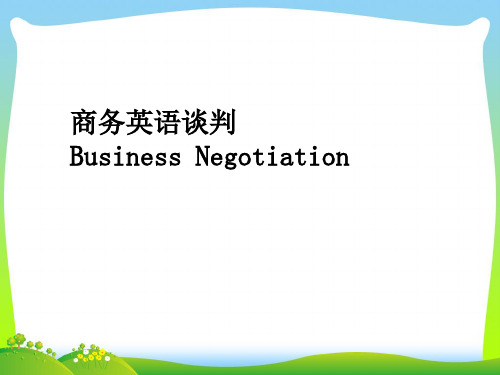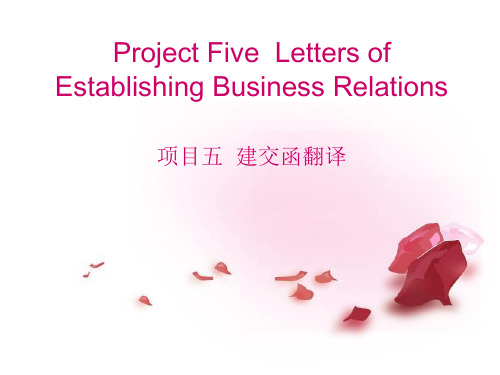商务英语谈判Project 6 Establishing Business Relations
- 格式:ppt
- 大小:576.50 KB
- 文档页数:3



重点:1)What is Negotiation“Negotiation”means “doing business”or a discussion aimed at reaching an agreement.Four main phases of negotiation:The preparing phase (预备阶段)The debating phase (争论阶段)The proposal phase (建议阶段)The bargaining phase(讨价还价阶段)或者是Pre-NegotiationFace-to-Face Negotiation ( At the Negotiation )Post-NegotiationWhat is business negotiationBusiness Negotiation is a kind of discussion aimed at reaching a business agreement or abusiness contract.Four stages in business negotiationnon-task sounding (开局前的试探)task-related exchange of information (交换与谈判目标有关的信息)persuasion (说服)concessions and agreements (让步与同意)3)Some Issues that Chinese Corporations and Negotiators Need to AddressChinese businessmen tend to have business negotiations in a rather indirect manner, as opposed to the direct manner of American businessmen.The decision-making process of Chinese companies is generally both slow and time-consuming. On the other hand, American companies usually operate with quick decision made by the top management.Different Business Communication Styles between China and the USAManner: Direct Manner / Indirect MannerDecision-Making: Quick, Top-Down / Slow, Tine-ConsumingWork Ethic: Individual Oriented / Social PressureValue Results more than its Process / Community Belonging, Priority to Planning Merits: Efficiency / Encourage CooperationCompetition in Workers / more HumaneDemerits: Frustrating Workers / Lack of Efficiency and Competition4)China’s Foreign Trade PolicyThe principle of China’s foreign trade is “equality, mutual benefit and exchanging what onehas for what one needs”.(平等互利,互通有无)5)An Introduction to the Five Links of International Business NegotiationEnquiry (询盘)Offer (发盘)Counter-Offer (还盘)Acceptance (接受)Conclusion of a Contract(缔结合同)Of course, it is not necessary to have all the five links taken for every transaction. Sometimes, only offer and acceptance will do. It is stipulated in the laws of some countries that only offer andacceptance are the two required factors, failure of which will make no contract.Brief Introduction to Incoterms®2010Incoterms are used in international import/export contract to show the responsibility of the buyers and the sellers. They define who is responsible for “freight”or “carriage”(transportation) , insurance against risks, “duty”(tariff) and “clearance”(import and export documentation).The word “INCOTERMS”is short for International Rules for the Interpretation of Trade Terms, and most frequently used in international sales transactions.The latest version is INCOTERMS ® 2010, which already became effective on Jan. 1st 2011. Previous versions, including INCOTERMS 2000, are now outdatedThe ® sign means a registered trade mark, it became a necessary part of Incoterms ®2010 International Tender or Bid 国际性招投标Concepts Related Tender or Bid onTender 投标(British English)Bid 投标(American English)submit a tender / bid(submission of tender / bid)投标Tenderer or bidder 投标者Winning bidder / successful tenderer 中标者To invite tender / bid 招标Invitation for (to) tender / Bids 招标Tenderee / the bid inviting party 招标人/ 招标方Generally speaking, people often using tendering / bidding to refer to invite tender / bid and tender / bid.Tendering / Bidding 招投标International tendering / international bidding 国际招投标Submission of Tender (投标)Tenders’/ Bidders’behaviors to deliver their bid / tenders forms to the tenderee according to the conditions of the Tender notice within the specified period of time.投标人根据招标公告或招标单规定的条件,在指定的时间内向招标人递盘的行为。


![商务英语谈判Project 6 Establishing Business Relations[精]](https://img.taocdn.com/s1/m/c0f8b9cf04a1b0717fd5dd43.png)
商务英语制定谈判计划**Negotiation Plan Development in Business English**In the realm of international business, effective communication is crucial for success. A well-structured negotiation plan, formulated in the language of business—English—can significantly enhance the chances of achieving favorable outcomes during discussions and collaborations. This article aims to guide you through the process of developing a negotiation plan tailored to the nuances of business English.**1. Understanding the Negotiation Context**Before formulating a negotiation plan, it is essential to comprehend the context of the negotiation. This involves understanding the background of the parties involved, the industry standards, and the cultural differences that might influence the negotiation process. A thorough understanding of these factors will help in framing the negotiation strategy and ensure that it aligns with the objectives and interests of all parties.**2. Setting Clear Objectives**Defining clear and specific objectives is vital for a successful negotiation. These objectives should be quantifiable, time-bound, and aligned with the overall strategic goals of the organization. For instance, the objective could be to secure a specific discount on a product, to establish a long-term supply agreement, or to negotiate favorable payment terms.**3. Analyzing the Other Party's Interests and Leverage Points**In business negotiations, it's crucial to understandthe interests and leverage points of the other party. This analysis helps in identifying areas of common ground and potential areas of conflict. By understanding the otherparty's needs and constraints, you can craft more effective arguments and proposals that are tailored to their interests.**4. Preparing the Negotiation Script**Preparing a negotiation script in business English is essential for ensuring fluent and professional communication during the negotiation. The script should include opening statements, key arguments, counterarguments,and closing statements. It should also incorporate diplomatic language that maintains a positive tone and avoids confrontation.**5. Practicing and Rehearsing**Practicing and rehearsing the negotiation script helps in identifying areas of improvement and enhancing confidence. Role-playing with team members or colleagues can simulate real-life negotiation scenarios and provide valuable feedback on how to handle different negotiation dynamics.**6. Anticipating and Planning for Contingencies**No negotiation plan is complete without contingency planning. Anticipating potential obstacles, setbacks, or unexpected changes in the negotiation landscape is crucial for maintaining flexibility and adapting to changing scenarios. Having alternative strategies and fallback plans can ensure that you remain prepared for any eventuality.**7. Closing the Negotiation**The closing phase of the negotiation is often the most critical. It involves summarizing the agreement, finalizingthe terms, and establishing a clear action plan. Using business English that is concise, direct, and confident can help in finalizing the deal and securing a favorable outcome for your organization.**8. Post-Negotiation Evaluation and Follow-Up**The negotiation process does not end with the signing of the agreement. Evaluating the outcome, learning from the experience, and following up on the agreed terms arecrucial for ensuring the long-term success of the negotiation. Regular communication and monitoring of the implementation of the agreement can help in maintaining positive relationships and fostering future collaborations. In conclusion, developing a negotiation plan in business English requires a thorough understanding of the negotiation context, clear objectives, analysis of the other party's interests, preparation of a professional script, practice and rehearsal, contingency planning, confident closing, and post-negotiation evaluation and follow-up. By following these steps, you can ensure that your organization achieves favorable outcomes in international business negotiations.**商务英语谈判计划制定**在国际商务领域,有效的沟通对于成功至关重要。
Business English Dialogues in PracticePart I: Establishing Business Relationships:Sample Dialogue 1:M: Good morning. I’m from the Hassan Company.W: Good morning. Have a seat please.M: W e’re interested in importing your bottling machine. If satisfactory, we may consider further orders.W: W ell, this unit here on display is our latest models. What do you think of it?M: Splendid. How about the patent?W: W e have 5 international patents that we are ready to sell.M: Do you have any brochure I can take with me?W: Y es. Here you are.M: How about the price list?W: Here it is.M: Thank you. I’ll contact you later.Sample Dialogue 2:W: Good morning. I’m Iboudji, from Nigeria.M: Good morning. I’m Zhang.W: Nice to meet you, Mr. Zhang.M: Sit down please, Miss Iboudji.W: This is my first visit to China. My purpose is to establishbusiness relations with your company.M: I’ll be glad to do what I can for you.W: Thank you. Now I’m thinking of importing raw materials from China.M: Have you anything particular in mind at the moment?W: I’d like to buy a large quantity of barites if your price is competitive enough.M: No problem. W e can supply them from stock.W: Now I’d like to have a look at the samples.M: This way, please. Our showroom is right over there.Sample Dialogue 3:W: Here are the samples of our T-shirts. They are available in all sizes.M: Mm. They look very nice.W: They are well known for their fine quality and especially popular with young people.M: I see.W: Look at these. They are good in material, fashionable in design and superb in workmanship.M: The quality seems all right, but the prices are too high.W: I don’t believe you could buy shirts of a similar quality at such a price elsewhere.M: W ell, if we could come to terms on the price, I may place a substantial order right away.W: Our manager is coming here soon. W e can have a further discussion when he comes.M: Ok. Thank you very much.W: My pleasure.Sample Dialogue 4:W: W ell, your plant is much larger than I expected.M: Really? W e’ll be happy to show you around.W: How long has your factory been established?M: W e have been operating for 10 years.W: That’s quite a long time, and I’m impressed with your quality control.M: Quality control is our primary consideration.W: Y ou are right here. W ell, I really enjoy every minute of the tour. M: It’s our pleasure.W: I’ll be looking forward to receiving the samples. If they look good, we’ll place our order soon.M: W e’ll do our best to meet your requirements.W: Thank you. Hope to see you soon.M: See you.Part II: Inquiry and Offer:Sample Dialogue 1:W: Nice to see you again, Mr. Green. How is everything?M: Fine, thanks. What about you?W: Good, thank you. Please have a seat.M: Thanks. Y ou know I’m particularly interested in your embroidered blouses. W ould you accept our orders according to our design and patterns?W: Y es, if the order is a sizable one.M: Can you quote me the price?W: Here’s our latest price list, FOB Shanghai.M: Thank you. I need some time to examine it and I’ll come back to discuss the details.W: All right. Thank you for your inquiry.M: Hope we can do business together.W: Me too.Sample Dialogue 2:W: W e have gone through your catalogue. W e are thinking of placing a trial order with you.M: What types and sizes are you interested in?W: These items of the machine tools. W ould you please give us theirspecific prices?M: Here is our latest price sheet.W: By the way, do you take special orders?M: Y es, we do.W: Good. How long does it usually take you to make delivery?M: As a rule, we deliver all our orders within 3 months after receipt of the L/C. And in no case will it take longer than 6 months. W: Good. Another thing, we’d rather have you quote us FOB prices. M: No problem.Sample Dialogue 3:W: Good morning. I’ve come here for your offer.M: Ah, we’ve noted your request in your letter.W: Then what’s your most favorable quotation?M: Our products are exquisitely made and reasonably priced. Y ou will find that our prices are most competitive.W: Are they FOB prices?M: Y es, they are.W: What risks do you cover?M: All Risks and W ar Risks are covered for 110% of the invoice value.W: What are your terms of payment?M: By confirmed, irrevocable L/C available by sight draft.W: Then could you tell me the earliest possible time of shipment? M: Within one month after your L/C reaches us.W: And your offer remains valid for…?M: Three days.W: W ell, thank you for your offer. I’ll call you tomorrow.M: Y ou’re welcome. W e look forward to hearing from you. Sample Dialogue 4:W: So you have come for our firm offer, Mr. Fitzegerald?M: Y es. Is that ready?W: Y es. Everything is ready. Here you are.M: Let me have a look. (reading) 5000 dozen Pure Cotton Bed Sheet at USD 220 per dozen, CIF New Y ork. Shipment will be effected in July or August.W: Is it Ok?M: It’s quite Ok, except for the price. Er …I’m afraid it’s no easy job pushing the sales at USD 220.W: W ell, as a matter of fact, what we’ve quoted is our rock-bottom price.M: Anyhow, I hope you can make it cheaper.W: Y ou’ll find our price is reasonable and profitable if you take the quality into consideration.M: Since that’s the case, I’ll accept it. I’m only afraid it’s not easy topersuade our clients to accept your price.W: They are no fools.Part 3: OrderSample Dialogue 1:W: Mr. Lin, you know we have been very happy with your products and services.M: Thank you for your kind remarks.W: Our General Manager is thinking of placing another order. But he told me he could get a better offer from another firm.M: Really?W: Do you think you can possibly cut down your price by 10%? M: I’m afraid not.W: Y our business is built on the principle of one price to all?M: It isn’t altogether a matter of dollars and cents. W e provide fine service, good work and prompt delivery.W: Ok. I’ll have a talk with our manager. Don’t send your business elsewhere.M: Old friends are the ones who count. We want to keep the business of old customers like you.W: Thank you. W e’ll contact you later.Sample Dialogue 2:W: Here is our quotation. All the prices are subject to our finalconfirmation.M: I think it would be difficult for us to push sales at such prices. W: Considering the recent market, I can assure you that our quotation is most favorable.M: I can’t agree with you here. It’s higher than some of the quotations from other sources.W: But you must take the quality into consideration.M: W e have another offer for similar quality at a much lower price.If you won’t lower your price, we’ll turn to other suppliers.W: W ell, to get business done, we can consider making some concessions.M: As a matter of fact, we are in the market for 5000 sets. If your price is competitive, we are prepared to increase our order to 10,000 set.W: In that case, we’re ready to reduce our price by 3%. That’s our last word. W e won’t entertain any counter-offer.M: W ell, I think I’ll order now.Sample Dialogue 3:W: I’m thinking of placing an order with you.M: What items are you interested in?W: Some sheets and table linens for my outlets. Maybe some other things.M: How about the quantity?W: About 2000 of each. But, what are the prices?M: W ell, as you know, that depends. W ould you have a look at the pamphlet on our prices?W: It’s a pretty big one. Do you mind if I keep it a little while?M: Not at all. Let me know the details of your order when you have an idea of what you want.W: Sure. But how soon can you deliver them to Tokyo?M: W e have a branch in Hongkong, so it will only take one week or so.W: Ok. I’ll contact you tomorrow.Sample Dialogue 4:W: May I know what particular items you are interested in?M: W e want to place an order for your FS04.W: Good, how many do you want to buy?M: W e’d like 80 sets for immediate delivery.W: That’s a very substantial order.M: I represent a large textile group. Our buying requirements are considerable indeed.W: I didn’t realize you were that big. Y ou know the unit price. That’s without freight and insurance. W e usually quote prices FOB Guangzhou.M: W ell, we prefer CIF New Y ork.W: No problem. W e can do that.M: What sort of discount could you offer me?W: Since it’s a bulk order, I’ll give 4% off the listed price. M: That’s good. I’ll accept it.。